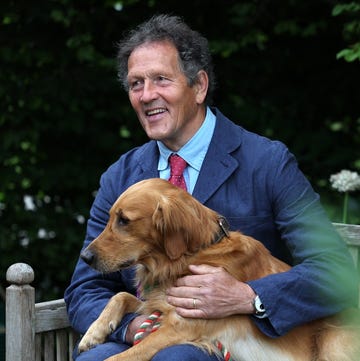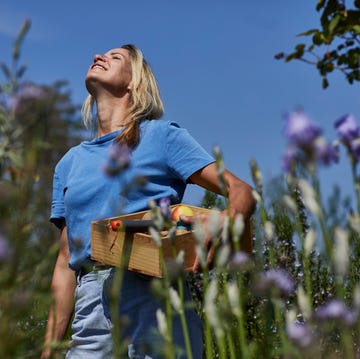Helen was strapped inside a Soyuz rocket somewhere over the Pacific Ocean when she caught her first view of Earth from space. She recalls seeing the curve of our home planet and how blue it looked against the black space above it. “I just kept going, oh, wow,” she tells me over video call, now firmly back on solid ground. “My commander was saying, ‘Well, what does it look like?’ because he'd not been in space before, but I just kept going, ‘Oh, wow!’ It took a while for it to sink in.”
Helen Sharman became the first British person to go into space in 1991, as part of a collaboration with the Soviet space programme. She was in space for a total of eight days, six of which were spent living on a space station conducting a range of experiments.
When my video call with Helen first connects, I do a slight double take. On my screen appears the head and shoulders of a woman on a brilliant white background, wearing a headset, complete with a microphone and a pair of clear-rimmed glasses I momentarily mistake for goggles. For just a fraction of a second, I feel like I’ve tuned into mission control, and am only half joking when I ask if she’s speaking to me from Earth.
Helen laughs and confirms she is, and I realise the white background is actually a set of wardrobes at her home in West London. Helen’s face is framed by her cropped, reddish-brown hair and the turtle neck of a green cable knit jumper. I can still hear the warm undertones of a subtle Sheffield accent as she chats to me, despite her time living in Southern England (and, briefly, in space).
“You never forget your local roots,” she says. “As a Sheffielder, there's lots of Northern culture that's forever a part of me.”
I ask whether, when Helen was at school back in Sheffield, she’d ever dreamed of one day venturing into space.
“When I was growing up, it was just not possible for people like me to be an astronaut,” she says. “It was all about American people who were in the military or fighter pilots. They were strong, tough, and nothing like anything I felt.”
A lover of many subjects, Helen wasn’t sure what she wanted to do when she left school, but decided to study chemistry as she thought it would give her a range of job options.
“It could have almost been any science to be quite honest, I wasn't very adventurous,” she tells me, something I find hard to believe of the person who would become Britain’s first astronaut.
When Helen was 26 years old, she was driving home from her job as a chemist making chocolate for Mars Confectionery, when she heard a radio advert which changed her life (and British history) forever.
“I came across an announcement for this mission that had been created specially to put the first British person in space. It said, ‘Astronaut wanted, no experience necessary,’” she recalls. “I'd got my chemistry education, I'd got some experience working in teams, I loved foreign languages, and learning Russian was going to be part of the training. I remember just sitting there going, wow, what an amazing opportunity.”
Despite her excitement, Helen nearly didn’t apply.
“I thought, I'm a young woman working in a chocolate factory, why would they choose me?” she says. “But, by the time I got home from work, I realised that if I didn't put myself forward, nobody would.”
13,000 other Britons also applied, and Helen was astounded to be invited as one of 250 for an initial screening day. Gradually, the number of candidates was whittled down to just two, through a series of medical, psychological and physical tests. These included being placed into a centrifuge machine, which spun to replicate the G-force that would be experienced in space.
The final two who were chosen to join the astronaut training programme in Russia were announced live on TV, and Helen found herself walking across the stage in a daze as her name was called.
“It wasn't until much later on that it started to really sink in, this was reality,” she says.
It was 1989 when Helen arrived at Star City in Russia to begin her 18 month course, having had just four days to pack up her home, leave her job and move countries. Almost nobody there spoke any English, including her Russian language teacher, who greeted her with, “Bonjour!” she tells me, laughing.
As well as learning to speak Russian, Helen’s training involved studying astro-navigation, ballistics and electronics, before moving onto simulators for the more practical aspects of life on the space station. She also completed parachute training, as part of emergency preparation for her return to Earth, and weightlessness training in an aeroplane.
Helen had arrived at Star City with her fellow candidate, Tim Mace, but only one of them would be going to space at the end of their training, while the other would be an emergency back up. Just a few weeks before the mission, Helen found out she had been chosen.
“Even on the day of the launch, if I caught a bad cold or tripped up and broke my ankle or something, then [Tim] would have flown instead of me,” she says. “I don’t think I let myself completely believe it until I was actually sitting on top of the rocket.”
So, what’s it really like to launch into space, I wonder? Is it anything like we see in the movies?
“At first, I had no sensation that we were really moving forward, because it began so slowly. Then, gradually, that thrust increases and I felt the acceleration as I was being pushed back into my seat,” describes Helen, explaining that because of the different stages of the launch, it’s actually quite a “lumpy, bumpy kind of transition” out of the Earth’s atmosphere.
Two or three minutes into the nine minute launch, Helen caught that first glimpse of Earth through the window. With her in the rocket were two other crew members, and all of them had work to do to get them to the space station safely. This meant an enormous amount of mutual responsibility.
“If I make a mistake in doing something vital, all my crew die,” says Helen. “I wanted to keep myself and my crew safe, but I also wanted to make sure that I did a good job and did Britain proud.”
There were two people on the space station already when Helen’s crew finally docked, and she describes the connection which quickly developed between the team of five.
“One of my fondest memories is that feeling of camaraderie,” she tells me. “That bond between people, how strong and close it can be. It was just fantastic.”
She recalls how the crew would share rye bread portions (they ate only dried or long -life Russian food) by breaking pieces off and pushing them through the air to be caught by one another.
I ask if she ever got used to that feeling of weightlessness, of seeing objects floating around her.
“It’s the most natural, relaxing feeling you can imagine. I completely forgot what weight feels like, what it's like to sit down and feel the seat beneath you,” Helen tells me. “You can push off from one wall and just float to another wall. It's such a relaxing feeling.”
However, not all of Helen’s experience in space was relaxing. For instance, she recounts the moment the emergency alarms began blaring and the power cut out, leaving the crew in silent darkness. Without fans to keep air circulating, they couldn’t stay in one place too long or they risked suffocating on the carbon dioxide from their own breath.
“When the emergency signals go off, that's when you suddenly realise, oh my goodness, something really bad could be going wrong,” she says.
Luckily, the fault could be fixed thanks to a replacement computer Helen had brought with her. The downside was that, to make room for the computer, her personal luggage allowance had been reduced to just 180 grams.
Helen’s clothes and toothbrush had been sent ahead of her, so she chose to bring a sentimental comic strip from a friend and a safety pin from her mum.
“Safety pins always come in useful,” she tells me, smiling. “I thought, that's a nice thing, and it reminds me of my mum.”
While Helen was in space, her job was to conduct a variety of experiments, including observing how plant roots function in space and growing protein crystals. At the end of their six day mission, she collected her research together and changed back into her spacesuit with the rest of the crew. It was time to begin the potentially treacherous journey back to Earth.
“You climb into your spacecraft, close the hatch and strap into your seats,” Helen describes. “The spacecraft separates from the space station with springs which sort of push you away. Then, when you're far enough, you can fire rocket engines that slows your speed in orbit so that you come back towards the Earth's surface, and then the atmosphere slows you further.”
Helen describes another “lumpy” journey and the strange sensation watching the “orange, almost white glow around the spacecraft” through the window, as they travelled back through the atmosphere and crashed, quite literally, back down to earth.
“It’s quite a jerk when the parachutes open and a big bump when you land. It's been described as a car crash. It was windy, so we were actually being pulled sideways and bounced head over heels until the rescue team pulled us out,” she recalls
Aside from some bruising in her mouth from bashing into her mouthpiece, Helen said she felt “euphoric” to have made it safely back home.
“One thing I only realised when I got back, was that I had not once thought about all my stuff while in space,” she says. “I realised people are important, so is making the world a better place, not just striving to own more stuff.”
I want to know, looking back on her incredible journey from school in Sheffield to a rocket in space, what was the key lesson she learned?
“In life, sometimes you just have to have a go,” she tells me, impassioned. “It's important not to let impostor syndrome get in between you and an amazing opportunity. You don't necessarily know what you're good at until you try it - I would have limited myself by not thinking big enough.”
In other words, we should all be reaching for the stars.
















